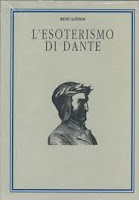Continuo la serie della descrizione dei libri di questo periodo di blocco forzato per malattia. E' ora il turno di questo particolare testo di Fulcanelli: un vero classico della letteratura ermetica. Chi non sapesse che è stato Fulcanelli, si faccia un tour in Internet per rendersi conto. Argomento troppo lungo e complesso per essere trattato in questa sede.
Il "Mistero delle Cattedrali" è un libro difficilissimo che descrive il significato ermetico della letteratura su pietra di alcune famose cattedrali francesi tra cui ovviamente Notre Dame a Parigi. Ovviamente questo è un livello quasi superficiale di lettura di questo libro poichè in pratica Fulcanelli descrive (si fa per dire data l'oscurità generale del libro) alcuni concetti chiave della trasmutazione e della scienza alchemica.
Data la mia limitatissima preparazione in materia, devo ammettere che forse ho compreso uno scarso 1% del contenuto di questo libro: certamente sono stato stimolato ad approfondire per farmi un'idea meno sfocata del mondo della scienza ermetica.
A guardarlo così, non si direbbe che questo libro sia una lettura ideale durante un periodo di malattia. invece non è così perchè è un libro bellissimo ed affascinante.
Inutile dire che la lettura di questo libro è inarrivabile per il lettore comune: un'opera fuori della portata di gran parte dei lettori. Per i pochi "eletti" però devo dire che...
_____________________
I here continue the description of the books I have read during this period of health adversity. Now I'm introducing this book from Fulcanelli, a real masterpiece of the hermetic literature. For those ignoring who Fulcanelli was, I can only suggest to spend a little time finding some info in Internet. The description of Fulcanelli is a too complex issue to be discussed here.
The "Mistery of the Cathedrals" is an extremely difficult book where Fulcanelli described the hermetic meaning of the "stone literature" shown in some famous french cathedrals such as Notre Dame in Paris. Of course this is the most superficial aspect of the book because, moving from this architectural description, Fulcanelli enters the obscure dimension of some concepts and principles of the transmutation and alchemy.
Due to my estremely limited knowledge about this topic, I have to admit that I have understood maybe about 1% of this book. Nonetheless it has stimulated my intention to better know the world of hermetic science.
From these considerations, maybe one could state that such a book is not recommended when you are ill: on the contrary, it has been, in my opinion, a very fascinating reading.
It's quite useless to say that this book is completely out of the common reader's reach. Yet, for the other people...






















